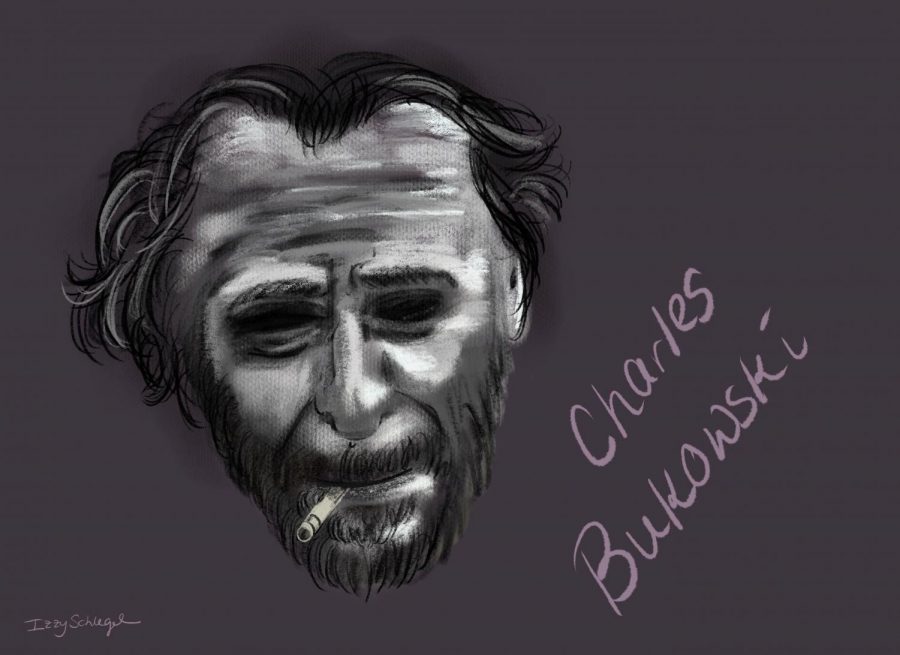The Poetry of Charles Bukowski
Bukowski’s poetry is unlike most of what you’ll read from any other poet. (Cartoon by Isabelle Schlegel | Daily Utah Chronicle)
June 1, 2020
Beauty is often tagged onto the symmetrical, the flawless — the things in life that beg to be looked at. The late German American writer Charles Bukowski found beauty in the disturbed, the taboo — the things in life that most tend to avoid or miss completely. Bukowski boasts an impressive body of work composed of short stories, novels and thousands of poems — lots of which explore controversial themes of violence, sex, poverty and more.
Bukowski is often pigeonholed into categories of cynicism and alcoholism, so much so that critics tend to overlook the delicate and sentimental intricacies prevalent in his work. To me, these little details and complexities are what make Bukowski’s poetry so profound and worth every bit of praise received.
Background
Born Aug. 16, 1920, in Andernach, Germany, but raised in Los Angeles, Bukowski had a rough childhood characterized by frequent abuse from his father and exclusion from other children because of his clothing, German accent and a severe case of acne he would later develop in his teenage years. Bukowski graduated from Los Angeles High School and attended Los Angeles City College for a couple of years before dropping out to pursue a writing career in New York.
Bukowski had little initial publishing success in New York and ended up quitting writing for about ten years. During those ten years, Bukowski worked at a pickle factory, a post office and other intermittent jobs as he wandered the United States. A hospital visit for a near-fatal bleeding ulcer is what got Bukowski back into writing — specifically writing poetry. In the ‘60s, Bukowski returned to his job with the U.S. Postal Service and continued to write poetry. Finally, Bukowski received an offer to work as a full-time writer for John Martin and Black Sparrow Press, quitting the post office job once and for all to “play at writer and starve,” as he put it.
Poetry
Bukowski’s poetry is unlike most of what you’ll read from any other poet. Bukowski wrote about humanity, but with a distanced and detached approach. From extended interview and documentary “The Charles Bukowski Tapes,” the man himself said, “The further away I am from the human race, the better I feel… I do not like the human race” — a cynical quote, no doubt.
Bukowski can certainly be a bit of a downer in his writing. In “Alone With Everybody” he says that there is “no chance / at all: / we are all trapped / by a singular / fate” and “nobody ever finds the one.” That’s some pretty bleak stuff, but the posthumously published, “The Laughing Heart,” gives us a glimpse into the more hopeful side of Bukowski with lines of positivity like “you can’t beat death but / you can beat death in life, sometimes.”
One of my favorite poems of Bukowski’s has to be “Bluebird” from the collection,“The Last Night of the Earth Poems.” One of, if not, the most honest of Bukowski’s poems, “Bluebird,” tackles themes of pent-up emotion and the weight of keeping up an image of strength, toughness and intelligence. This resistance of showing one’s true and vulnerable self is represented by the suppressing of a bluebird in Bukowski’s heart that wants so desperately to be free.
My favorite stanza is the last, and it reads, “then I put him back, / but he’s singing a little / in there, I haven’t quite let him / die / and we sleep together like / that / with our / secret pact / and it’s nice enough to / make a man / weep, but I don’t / weep, do / you?” The irony in this stanza so beautifully portrays man’s struggle with society’s standards of masculinity — it’s so very honest and doesn’t attempt to end on a note of positivity, but one of realness.
That is what I love most about Bukowski and his writing — he writes with honesty, he acknowledges that which often gets swept under the rug and he uncovers the harsh truths of reality.









J.A. Carter-Winward • Jun 2, 2020 at 7:31 am
Thank you for this article, Mr. Dunn. Fantastic, and coming from the U, it gives me hope.
As a local writer and poet, I’ve found my passion for Bukowski something patronizingly indulged (at best) to not-so-politely sneered at (worst), specifically within academic circles (sorry guys). It’s a circle to which I don’t belong, despite what I’ve accomplished as a poet and writer in the real world.
I attended the U briefly, and a head injury cut my college aspirations short, then off. When I re-learned to read, I realized the head injury took vital parts of my ability to function, but it didn’t take something I’d always had–my love of words and expressing them through writing poetry and stories. Bukowski, among other “unlettered heroes,” gave me the courage to keep going, keep learning outside academia.
However, I found that without the college degree, no one would bother with me or my work. I didn’t lack a CV, I lacked letters after my name granted by the educational system, which has improved with ADA-compliance, but there are no ramps or hand rails in the NYC publishing game. There are no “reasonable accommodations” for someone with a TBI, who can’t follow a simple cake recipe, but can write a complex poem or novel.
I don’t condemn academia or higher learning–do it, do it if you can. However, its position today as the arbiter of “real” or quality art is, in this writer’s opinion, unwarranted and exclusionary.
Bukowski’s style appealed to me back in high school (he was still alive then) because I’m musical. While others can’t hear or feel it in his work, the inherent musicality in his work is in there. He just doesn’t need a particular form to hit us over the head with it. The simplicity of his poetry refuses to bow down to “the genius of the crowd.” I’ve been called “the female Bukowski,” but I doubt that. I hate whiskey. 😉
Thanks for this write-up. I look forward to the new generation opening doors wider, not making them narrower. I’ve guest lectured at universities, spoken at Sigma Tau Delta events, and I love being in the hallowed halls of learning. I love hearing my voice echoing in the auditorium, using Bukowski’s words, laughing, “so you want to be a writer?”
Again, great piece. Incidentally, some of Bukowski’s poetry can be found on YouTube, set to “inspirational music” and images. A man with a gravelly, British accent reads, and I can’t help but think how much Bukowski would hate this co-op of his work.
His disgust would be, of course, “perfect.”